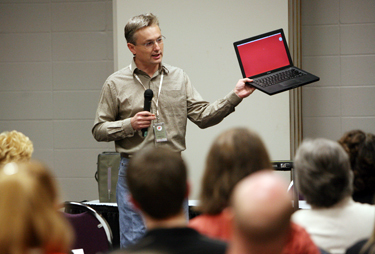Scottish academics hoping to dump pens for laptops in exam halls
 Mar 2 : A Scottish university is trying to break the tradition of writing lengthy exam papers with a pen – by allowing students to bring their laptops into the exam hall.
Mar 2 : A Scottish university is trying to break the tradition of writing lengthy exam papers with a pen – by allowing students to bring their laptops into the exam hall.
According to academics, it is fairer to permit undergraduates to use their typing skills rather than insist on painful hours of writing answers.
Edinburgh University's divinity students will sit for the preliminary exams as part of the exam essay revolution and, if it works out, the idea will be extended to finals in all subjects.
Students will be provided with an option of using their own laptop or a computer given to them by the university.
In either case, the systems will have special exam software installed which will give them a word processor but lock the computer so that the student will not be able to access any other programmes or data in the machine.
The software will automatically save the answers throughout the exam, and at the end of the test, the student will receive a copy of their work.
"For students of today, setting written exams which they must answer in handwriting is asking them to use an obsolete technology to which they are no longer accustomed,” the Scotsman quoted Professor Simon van Heyningen, Edinburgh's vice-principal for learning and teaching, who is overseeing the pilot, as saying.
"We have been looking into this idea for a long time and we are now ready to move to a reasonably sized trial and depending on that it will be made available for more exams. A side issue is that this will make exams easier to mark, although that is a side issue: this is being done for the students," he added.
James Alexander, the president of the National Union of Students in Scotland, said: "It's a very exciting idea, and it's a great move forward.
"It will also help with unbiased marking because no-one will know you by your handwriting. This way, your exam script will be completely anonymous and you will be marked solely on the content."
For the trial, students will be divided into two groups, half typing out their answers and the rest writing their essays.
Teams of transcribers will then type out the handwritten answers and a team will write out the computerised answers in longhand. Both sets of papers will then be marked and any differences analysed. (ANI)